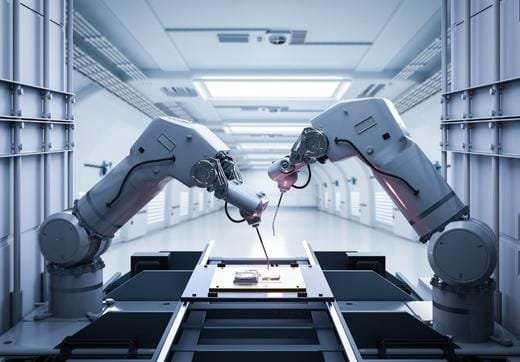Artificial intelligence, or AI, has become a buzzword in the business world, and for good reason. This technology has the potential to transform the way businesses operate, from automating mundane tasks to predicting customer behavior and identifying new business opportunities. As AI continues to advance, it is crucial for businesses to understand its capabilities and how to harness its power to stay competitive.
In this article, we will take a deep dive into the future of AI in business, exploring its potential impact on different industries, the challenges and opportunities it presents, and how businesses can prepare for this transformative technology.
AI in Business: What is it and Why is it Important?
Artificial Intelligence is the ability of machines to perform tasks that typically require human intelligence. These tasks include learning, reasoning, perception, and decision-making. In business, AI can automate processes, analyze data, and provide valuable insights to help companies make better decisions. AI can also enhance the customer experience by providing personalized recommendations and improving customer service.
The importance of AI in business is becoming more evident as companies seek to remain competitive in today’s fast-paced market. AI can help businesses streamline operations, reduce costs, and increase efficiency. It can also help companies identify new opportunities, improve products and services, and create new business models.
The Potential Impact of AI on Different Industries
AI is already making waves in various industries, and its potential impact is enormous. Here are some of the ways AI is transforming different sectors:
 Healthcare
Healthcare
AI is revolutionizing healthcare by enabling faster and more accurate diagnoses, predicting diseases before they occur, and providing personalized treatment plans. AI-powered robots are also helping with tasks such as surgeries and patient monitoring, reducing the workload of healthcare professionals.
 Finance
Finance
In the finance industry, AI is helping to detect fraud, automate trading, and analyze customer data to identify new investment opportunities. AI-powered chatbots also provide personalized customer service, reducing the need for human interaction.
 Retail
Retail
Retail businesses are utilizing AI to analyze customer data to personalize shopping experiences and offer recommendations based on past purchases. AI-powered robots are also used in warehouses to optimize inventory management and reduce costs.

Manufacturing
In the manufacturing industry, AI is used to optimize production processes, identify potential equipment failures before they occur, and reduce downtime. AI-powered robots also perform tasks such as welding and painting, improving efficiency and reducing errors.
Transportation
AI is transforming the transportation industry by enabling autonomous vehicles, optimizing route planning, and predicting maintenance needs. AI-powered robots are also being used in warehouses to automate tasks such as loading and unloading, reducing the workload of human workers.
Supply Chain Management
AI is also being used to optimize supply chain management. AI-powered systems can analyze inventory levels, predict demand, and optimize delivery routes, resulting in significant cost savings for businesses. In the future, AI will help businesses to make real-time decisions based on data, resulting in increased efficiency and agility.
Marketing
AI is transforming the way businesses approach marketing. AI-powered algorithms can analyze customer behavior and preferences, providing businesses with insights that enable them to create targeted marketing campaigns. In the future, AI will enable businesses to create hyper-personalized marketing experiences, resulting in increased customer engagement and conversion rates.
The Challenges and Opportunities of AI in Business
While the potential benefits of AI are immense, there are also challenges in the business process that must be overcome to fully realize its potential. Here are some of the challenges and opportunities of AI in business:
Data Quality
AI is only as good as the data it is trained on, which means that businesses must ensure that the data they use is accurate and of high quality. This can be a challenge, especially when dealing with large amounts of data from multiple sources.
Ethical Considerations
As AI becomes more prevalent in business, ethical considerations become more important. Businesses must ensure that their AI applications are not biased and do not discriminate against certain groups of people.
Talent Shortage
AI is a complex technology that requires specialized skills to develop and implement. As a result, there is a talent shortage in this area, making it difficult for businesses to find the right people to help them harness the power of AI.
Cost
Implementing AI can be expensive, especially for small and medium-sized businesses. The cost of developing and implementing AI systems can be prohibitive, making it difficult for some businesses to take advantage of this technology.
Despite these challenges, there are also opportunities that AI presents for businesses. Here are some of them:
Increased Efficiency
AI can automate mundane tasks, freeing up time for employees to focus on more strategic activities. This can increase efficiency and productivity, allowing businesses to accomplish more in less time.
Better Decision-making
AI will continue to provide businesses with valuable insights that can improve decision-making and help companies stay ahead of the competition.
Improved Customer Experience
New Business Opportunities
AI can help businesses identify new business opportunities by analyzing large amounts of data and identifying trends humans may miss. This can help businesses stay ahead of the curve and identify new areas for growth.
How Businesses Can Prepare for the Future of AI in Business
To prepare for the future of AI in business, companies must take several steps:
Identify Areas for AI Implementation
Businesses must identify areas where AI can have the greatest impact and prioritize those areas for implementation. This could include automating repetitive tasks, improving customer service, or optimizing production processes.
Invest in AI Talent
To harness the power of AI, businesses must invest in AI talent. It includes hiring data scientists, AI developers, and machine learning experts. Businesses could also train existing employees in these skills or partner with external vendors who specialize in AI.
Ensure Data Quality and Security
To make AI systems work effectively, businesses must ensure their data is accurate, up-to-date, and secure. This includes implementing data governance policies, ensuring data privacy, and protecting against cyber threats.
Plan for Ethical Considerations
Another challenge associated with AI is ethical concerns. As AI becomes more advanced, questions arise about its impact on privacy, bias, and accountability. Businesses must plan for ethical considerations when implementing AI systems. Ensuring that they are transparent, fair, and unbiased and that they protect against discrimination and privacy violations.
Start Small and Scale Up
To minimize risk and cost, businesses can start small and scale up their AI implementation as they gain more experience and see the benefits. It means piloting AI in a single department or using AI for a specific task before expanding its use.
Conclusion
The future of AI in business is exciting and full of potential. As this technology continues to advance, businesses must prepare themselves for its impact by identifying areas for implementation, investing in AI talent, ensuring data quality and security, planning for ethical considerations, and starting small and scaling up. By doing so, businesses can stay ahead of the curve and harness the power of AI to drive innovation and growth in the years to come.
FAQs
Will AI replace humans in the workplace?
AI has the potential to automate many tasks that were previously done by humans, leading to job displacement. However, it is unlikely that AI will replace humans entirely, as many tasks require human intuition and creativity. Instead, AI will likely augment human capabilities by performing repetitive and mundane tasks, leaving humans to focus on more creative and strategic work. Additionally, businesses will still require human workers to manage and maintain their AI systems, ensuring they are functioning correctly and being used ethically.
How can businesses ensure that AI is developed and used in an ethical manner?
Businesses can ensure that AI is developed and used in an ethical manner by establishing ethical guidelines for its development and use. This includes ensuring transparency in decision-making processes, identifying and addressing potential biases in algorithms, and prioritizing the privacy and security of user data.
What industries will be most impacted by AI in the future?
AI has the potential to impact numerous industries, but some of the most significant impacts will likely be in healthcare, finance, retail, and manufacturing.
What are some examples of AI in business?
Some examples of AI in business include chatbots for customer service, predictive analytics for sales forecasting, and autonomous robots for manufacturing and logistics.
How can businesses prepare for the integration of AI into their operations?
Businesses can prepare for the integration of AI by investing in employee training and development, establishing clear goals and objectives for using AI, and collaborating with experts in AI and related fields.
What is Artificial Intelligence (AI)?
AI is a field of computer science that focuses on creating intelligent machines that can perform tasks that would typically require human intelligence, such as visual perception, speech recognition, decision-making, and language translation. AI systems can be classified into various types, including rule-based systems, machine learning systems, and deep learning systems.
How can businesses make use of AI?
Businesses can leverage AI technologies to automate repetitive tasks, such as data entry, customer service, and compliance checks. They can also use AI to analyze large datasets and uncover actionable insights to inform strategic decision-making and improve business operations. Additionally, businesses can integrate AI with other technologies, such as customer relationship management (CRM) systems and workflow automation tools, to streamline their processes and enhance the customer experience.
What is the future of AI in business?
The future of AI in business is bright, with many companies embracing AI technologies to transform their business operations and achieve growth. AI will play a critical role in enabling businesses to automate tasks, reduce errors, and improve decision-making.
As AI technologies continue to advance, we will likely see more sophisticated AI applications that can learn from data and make complex decisions autonomously, ultimately leading to greater efficiency and productivity.
How can businesses adopt AI?
A: There are several ways businesses can adopt AI, depending on their needs and resources. One option is to develop their AI capabilities in-house by hiring AI experts and building custom AI solutions. Another option is to use off-the-shelf AI tools and services provided by AI vendors.
Additionally, businesses can partner with AI consultants to help them identify areas where AI can add value and develop an AI strategy that aligns with their business goals.
How can AI help businesses automate?
AI can help businesses automate tasks by using machine learning algorithms to perform repetitive tasks with high accuracy and speed. For example, businesses can use AI to automate data entry, invoice processing, and inventory management, allowing them to focus their resources on more strategic tasks. Additionally, AI can be used to automate customer service, such as chatbots that can answer frequently asked questions and resolve customer issues in real time.
What types of AI are commonly used in business?
There are various types of AI systems that businesses can use, depending on their needs. Rule-based systems use a set of predetermined rules to make decisions while machine-learning systems can learn from data and improve over time. Deep learning systems are machine learning that uses artificial neural networks to process and represent complex data. Additionally, businesses can use natural language processing (NLP) and computer vision technologies for applications such as speech recognition and facial recognition.
What are the benefits of AI for businesses?
Some of the benefits of AI for businesses include increased efficiency, improved accuracy, reduced errors, and enhanced decision-making. AI can also help businesses identify new opportunities and streamline their processes to achieve growth. Additionally, AI can be used to enhance the customer experience by providing personalized recommendations and resolving issues quickly and efficiently.
What does the rise of AI mean for business strategy?
The rise of AI is reshaping business strategy and changing the way companies operate. Businesses that incorporate AI into their operations can achieve greater efficiency and productivity, while those that do not may struggle to remain competitive. AI technologies can inform strategic decision-making by providing insights that may not be visible through traditional analytics tools. Additionally, businesses can use AI to automate tasks and free up resources to focus on innovation and growth.
What impact will AI have on business operations?
AI will have a significant impact on business operations by enabling businesses to automate tasks, reduce errors, and improve decision-making. AI technologies can also transform businesses’ workflows, allowing them to operate more efficiently and respond more quickly to changing market demands. Additionally, AI can help businesses identify new opportunities and reduce costs, leading to increased profitability and growth.



